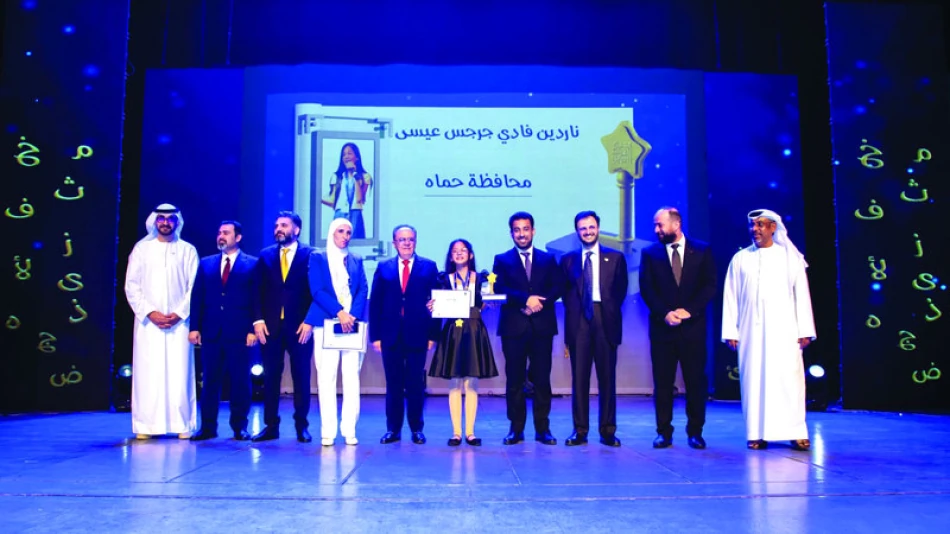
Syrian Reading Challenge Champion Nardin Issa Inspires Literacy Across the Region
Syria's Young Reading Champion Emerges from Massive Literary Competition
Sixth-grader Nardin Fadi Georges Issa has claimed the top prize in Syria's ninth Arabic Reading Challenge, triumphing over more than 583,000 student competitors from across the war-torn nation. The victory highlights Syria's remarkable commitment to educational excellence despite ongoing challenges, with participation numbers that rival pre-conflict levels and demonstrate the resilience of the country's educational infrastructure.
Record Participation Signals Educational Recovery
The competition drew an impressive 583,127 students from 5,005 schools nationwide, supervised by 9,749 educators. These figures represent a significant achievement for Syria's education system, which has worked to rebuild and maintain academic standards throughout years of conflict. The scale of participation suggests that educational priorities remain strong across Syrian communities, with families and institutions prioritizing literacy and Arabic language preservation.
Nardin, a student at the Arab Women's School in Hama, was announced as the winner during a ceremony in Damascus attended by high-ranking government officials, including representatives from Syria's presidential office and multiple cabinet ministers. The event also featured participation from Dr. Fouzan Al-Khalidi, Director of Programs and Initiatives at the Mohammed bin Rashid Al Maktoum Global Initiatives Foundation.
Diverse Winners Across Categories
The competition recognized excellence across multiple categories. Mohammed Turbah Dar, a ninth-grade student from Homs, won the top prize in the special needs category, competing against 220 participants. Rashad Salem Ahmed from Damascus countryside earned the "Distinguished Supervisor" award, while Al-Bayan Model School received recognition as the "Distinguished School."
The top ten finalists represented schools from across Syria's major cities, including Damascus, Aleppo, Homs, and coastal regions, demonstrating the competition's truly national reach and the distributed nature of educational excellence throughout the country.
Regional Context and Educational Diplomacy
Syria's strong performance in the Arabic Reading Challenge reflects broader regional trends toward educational soft power and cultural diplomacy. The UAE-sponsored initiative has become a significant platform for Arab nations to demonstrate their commitment to Arabic language preservation and educational development.
Dr. Mohammed Turku, Syria's Education Minister, emphasized that the widespread participation reflects the ministry's dedication to encouraging reading and academic competition among students. His comments highlight how educational achievement has become a symbol of national resilience and cultural continuity.
Historical Success Pattern
Syrian students have consistently performed well in the competition's recent editions. In 2022, student Sham Al-Bakour claimed the overall regional title, followed by Hatem Mohammed Jasem Al-Turkawi in 2024. This track record suggests that Syria's educational focus on Arabic literacy and reading comprehension has created sustainable competitive advantages.
Broader Educational Implications
The competition's scale—reaching over 32 million students across 50 countries globally—positions it as one of the world's largest literacy initiatives. For Syria, participation at this level serves multiple strategic purposes: maintaining educational standards, preserving Arabic language skills, and demonstrating the country's continued integration with broader Arab educational and cultural networks.
The initiative, launched in 2015-2016 under the direction of UAE Vice President Sheikh Mohammed bin Rashid Al Maktoum, aims to embed reading as a daily cultural practice while strengthening Arabic's role in knowledge production and dissemination. For participating countries like Syria, it provides international recognition for educational achievements and creates valuable cultural exchange opportunities.
Investment in Future Human Capital
From an economic development perspective, Syria's strong showing in literacy competitions signals important investments in human capital formation. Countries emerging from conflict typically face significant challenges in maintaining educational quality, making Syria's consistent high-level performance noteworthy for international observers and potential development partners.
The competition's emphasis on cross-cultural understanding and tolerance through reading also aligns with post-conflict reconstruction goals, potentially contributing to social cohesion and preparing students for eventual regional reintegration and international engagement.
Most Viewed News

 Sara Khaled
Sara Khaled






